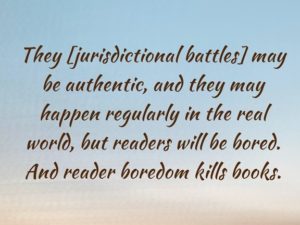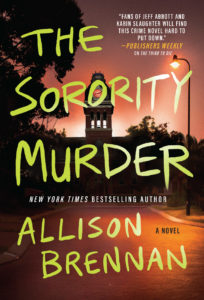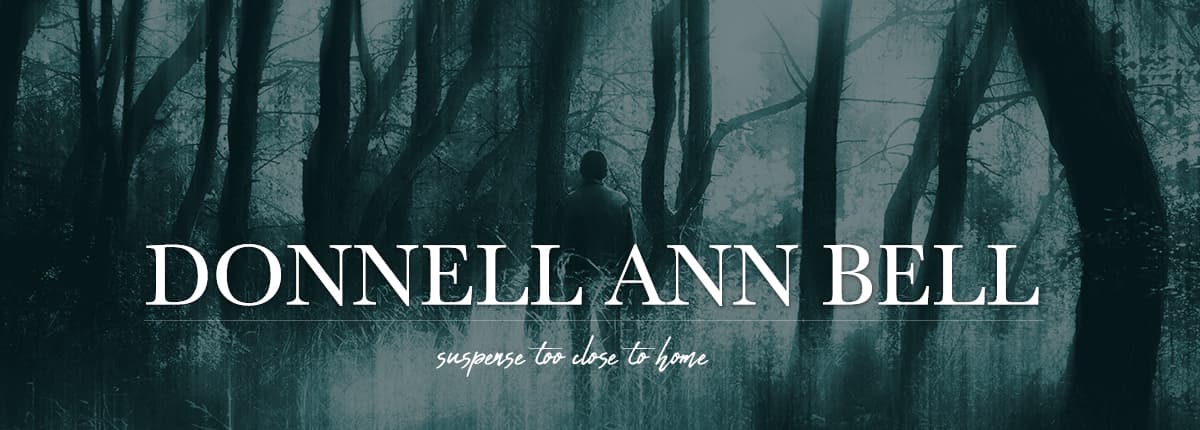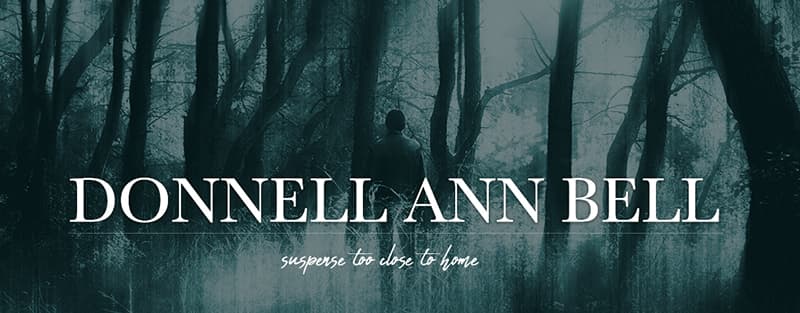
Writers make up a tight-knit community in the mystery and thriller genre. One of my favorite people in this group is Allison Brennan. She recently brought up a critical point about research. I thought her advice was spot on and I asked her to share. Please welcome Allison Brennan to my blog and Help From My Friends Friday ~ Donnell
You Can Get Away with Almost Everything …
By: Allison Brennan

New York Times & USA Today Bestselling Author Allison Brennan
Thank you Donnell for inviting me to take over your blog today! I love talking about writing, and I especially love talking about research.
Donnell and I are long-time members of a fantastic group called Crimescenewriter. Here, writers can “meet” experts — current or retired cops, FBI agents, private investigators, paramedics, doctors, military, pathologists, and more. We can ask questions about procedures and offer what-if scenarios so we can understand better what a particular character would do (or should do!)
As writers, Donnell and I understand that our imaginations can sometimes go too far … our ideas seem logical or cool or we have great concept. But then as we start writing about this Next Cool Idea, it seems to fall apart. What do you mean that DNA tests take more than a day? Why can’t I get a warrant? Why can’t my FBI agent leave the state to investigate?
One thing I’ve learned is that with a big enough imagination coupled with people to help you brainstorm, you can pretty much get away with almost everything.
The first key point: I’m writing fiction. I write to entertain. Yes, I strive to make my crime thrillers as real as possible. But sometimes, I can’t wait weeks for a DNA test or I can’t write about complex jurisdictional battles. They may be authentic, and they may happen regularly in the real world, but readers will be bored. And reader boredom kills books.
So I have to balance writing an entertaining and believable story. To do that, I need to make sure that what my characters do is plausible. It might not be probable and it could be unlikely, but as long as my readers can buy into the actions of my character, I’m good with it.
Part of this is simply done by establishing your character as someone who knows what she’s doing. The other part is to make the details as accurate — or believable — as possible.
 In one of my books, I needed DNA tests quickly. I know that it takes weeks, sometimes longer, to get a DNA test done. But the test itself takes less than 24 hours. So once the lab tech starts processing the DNA, you’ll have the results the next day. How do I get around the real-life delay to get my character results faster? It helped that her ex-husband was the head of the FBI crime lab and did it for her “after hours.”
In one of my books, I needed DNA tests quickly. I know that it takes weeks, sometimes longer, to get a DNA test done. But the test itself takes less than 24 hours. So once the lab tech starts processing the DNA, you’ll have the results the next day. How do I get around the real-life delay to get my character results faster? It helped that her ex-husband was the head of the FBI crime lab and did it for her “after hours.”
Understanding how governments and bureaucracies work is also super important. When I learned about the FBI’s Office of Professional Responsibility, I realized how wide a latitude my characters had for potential punishment for breaking protocols.
In one of my early books, I fell into the trap of “I don’t know what I don’t know.” I was in the middle of writing a trilogy about a prison break (earthquake under San Quentin caused the wall to collapse in the exercise yard and a bunch of death row inmates escaped.) For the trilogy, the FBI was helping local law enforcement to apprehend the escaped convicts. My Sacramento-based agent had been assigned to talk to friends, family, former associates of one of the escapees, an ex-cop who had been convicted of killing his wife and her lover.
My FBI agent character was personally invested in the case (a long story!) and when there was a sighting of this convict in Montana, he went to follow-up and track him.
Well — I had some huge problems with this from a realistic standpoint. It was this story that led to my involvement with the FBI citizen’s academy and friendship with the Media Outreach agent. I had already written the book and had received notes from the copyeditor. So I reached out to my local FBI office expecting an easy answer. On the question, the answer was easy, but he told me my set-up was wrong — that an FBI agent wouldn’t be allowed to leave his jurisdiction to follow-up. They would assign the follow-up to the local FBI office.
I was stunned. (What do you mean what I learned on television isn’t accurate?!?) But my book was done and I was just working through the copyedits. I couldn’t make a major change like this character isn’t going to Montana! The whole book is set there!
So I asked my friend , “What would happen if he went to Montana anyway?”
His answer? Basically, “Anything from a slap on the wrist to being brought up in front of the Office of Professional responsibility and subsequently fired.”
Wow — this was actually better for my story. My character Mitch was known to butt heads in the office and not always follow orders, so it would completely work that he would disobey protocols and go to Montana to follow this lead. Even better, he was the main character of the next book so the fall-out from book two (Tempting Evil) of the trilogy made book three (Playing Dead) even stronger because he was suspended without pay for two weeks and removed from the case. And of course his continued investigation created huge problems for him and his office. But it fit his character and that’s what sold it to me and to my readers.
to butt heads in the office and not always follow orders, so it would completely work that he would disobey protocols and go to Montana to follow this lead. Even better, he was the main character of the next book so the fall-out from book two (Tempting Evil) of the trilogy made book three (Playing Dead) even stronger because he was suspended without pay for two weeks and removed from the case. And of course his continued investigation created huge problems for him and his office. But it fit his character and that’s what sold it to me and to my readers.
There are rules that cops and agents and lawyers have to follow …. but there is almost always a way to get around them. That’s why writers are gifted with vivid imaginations.
Whenever you’re trying to work through a story problem, know what would most likely happen in the real world, and then go from there. What can your character get away with? You might not be able to suspend the laws of gravity, but you can still find a way to make him fly.
Do you have any plot problems you’re trying to work through? Or a research story like mine that helped you solve a problem? Let us know.
 About the Book:
About the Book:
“Fans of Jeff Abbott and Karin Slaughter will find this crime novel hard to put down.” —Publishers Weekly on The Third to Die
New York Times bestselling author Allison Brennan’s latest suspense is about a college senior’s podcast that delves into an unsolved campus murder of a popular sorority girl, with individual callers exploring facts previously thought to be true.
Lucas Vega is obsessed with the death of Candace Swain, who left a sorority party one night and never came back. Her body was found after two weeks, but the case has grown cold. Three years later while interning at the Medical Examiner’s, Lucas discovers new information, but the police are not interested.
Lucas knows he has several credible pieces of the puzzle. He just isn’t sure how they fit together. So he creates a podcast to revisit Candace’s last hours. Then he encourages listeners to crowdsource what they remember and invites guest lecturer Regan Merritt, a former US marshal, to come on and share her expertise.
New tips come in that convince Lucas and Regan they are onto something. Then shockingly one of the podcast callers turns up dead. Another hints at Candace’s secret life…a much darker picture than Lucas imagined—and one that implicates other sorority sisters. Regan uses her own resources to bolster their theory and learns that Lucas is hiding his own secret. The pressure is on to solve the murder, but first Lucas must come clean about his real motives in pursuing this podcast—before the killer silences him forever.
About the Author: Allison Brennan is a New York Times and USA Today bestselling author of more than 40 books and numerous short stories. Her current release is Tell No Lies, the second book in her Quinn & Costa FBI thriller series, and her upcoming book on December 28 is The Sorority Murder, the first book in a limited series following former US Marshal Regan Merritt. Visit her website at http://allisonbrennan.com











I emailed Allison and asked her a couple of questions about an FBI agent and time in service and his duties.
Thanks Donnell for having Allison on your blog today.
My pleasure, Kathy.
Thanks, A, for being my guest today. And I agree, Regarding research, it never hurts to know policy and procedure and try to get it right, whenever possible. But, darn, that DNA, and the backups in the lab, and the crime that keeps them in business.
Thanks for the timely post. Later this month I’m doing a presentation: “Why do research if you’re writing fiction?” I will definitely share some of Allison’s observations–with attribution of course!
I want to know more about this Crimescenewriters group. And is it that easy to call up the FBI for questions? Wow. Great information. Thanks Allison and Donnell.
In my experience, readers are more discerning than television viewers. Maybe because as mystery readers they’re studying the plot as we’re reading and there’s so much more material to shift through than a screen play type format.
I listened to Tell No Lies on a road trip to Colorado. I thought it was well researched and well plotted. Good job, Allison. And I loved how well informed you are on the Arizona desert and the upheaval going on there right now.
Donnell and Allison,
Thanks for this great post. I love the word “plausible.” It’s what I use when I ask law enforcement sources a question regarding an action in my one of my books: Could this possibly happen? And I take it from there.
Marilyn, exactly, plausibility. Besides police procedure and law enforcement there is so much to consider. Laws in every state are different. Is it the state about which I’m writing a Medical Examiner state or a coroner state (and does it have both as in Colorado?) I like the phrase, do I know or do I think I know. I do my best to find out.
So good to see you today, Allison. I know you and Donnell work hard to get your research correct. The Crimescenewriter blog is fantastic.
Great points on the art of research, Allison. You’re absolutely right about the delays of DNA tests and jurisdictional dilemmas. I’m glad you’re FBI agent got away with only a slap on the wrist and still apprehended the fugitive. Speaking of television, one thing that gives me a good laugh is how quickly the legal system moves, as depicted on these shows. It’s like they put the speedy trial rule on steroids, but then again, a little artistic license added to the mix never hurts. Good luck with your writing.
Thank you, Allison! Great examples on how to get around a sticking point. And thanks for the tip about the Crimescenewriter blog!
Thank you so much Donnell for having me here today! I love talking about research 🙂 ….
Michael: the legal system is a great example, a lot of “willing suspension of disbelief” when getting things through the system, LOL. My daughter is a cop and she has to go in to testify when someone she arrested is on trial and it’s MONTHS later. And apparently, because of COVID, the system is so backed up I don’t know how they’re going to do any speedy trials. That’s another story …
Vicki! I miss you and Donnell and conferences … someday!
Always happy to help you Kathy! 🙂
Interesting information and a lesson that you can’t trust what is portrayed on television. Thank you.
Great post. I enjoyed it and I can imagine the panic when you learned that little tidbit about the FBI agent traveling. Glad it had a good resolution and helped in subsequent nooks!
LINDA: Feel free to use any of my comments or share my story! I have more (including things I got wrong in books, yikes!)
MICKI: Donnell posted in the comments more about the crime scene writers group if you want to join! It’s a great resource for information 🙂
GRACE: Yes! Exactly! I made a lot of really dumb mistakes in my earlier books because I trusted the television crime shows … the one thing I can say about TV is that it does help me figure out what I can condense and what is important to show readers. Law & Order is a great example of going in late to a scene and leaving early, to avoid all the unnecessary details. But I definitely have to be careful to research things I think I already know, LOL
DONNELL: I’m so glad you liked TELL NO LIES. I can’t listen to my own audiobooks because it sounds funny to me, LOL. I actually started writing that book before I moved to Arizona, and now my daughter is about to start U of A! Ha.
DONNELL: Whoops, didn’t post my comment thanking you for the shout out about TELL NO LIES! I actually started writing that book before we even decided to move to Arizona. Now, my daughter is going to U of A!
I find it very weird to listen to my audiobooks. I think because I expect it to sound one way, and the narrator is reading my words to me, it’s bizarre! LOL I don’t know if you have the same problem …
Allison, thank you, for being my guest today! Hope to connect in person soon! Keep writing those great books!
Lots of good advice from Allison. Thanks!